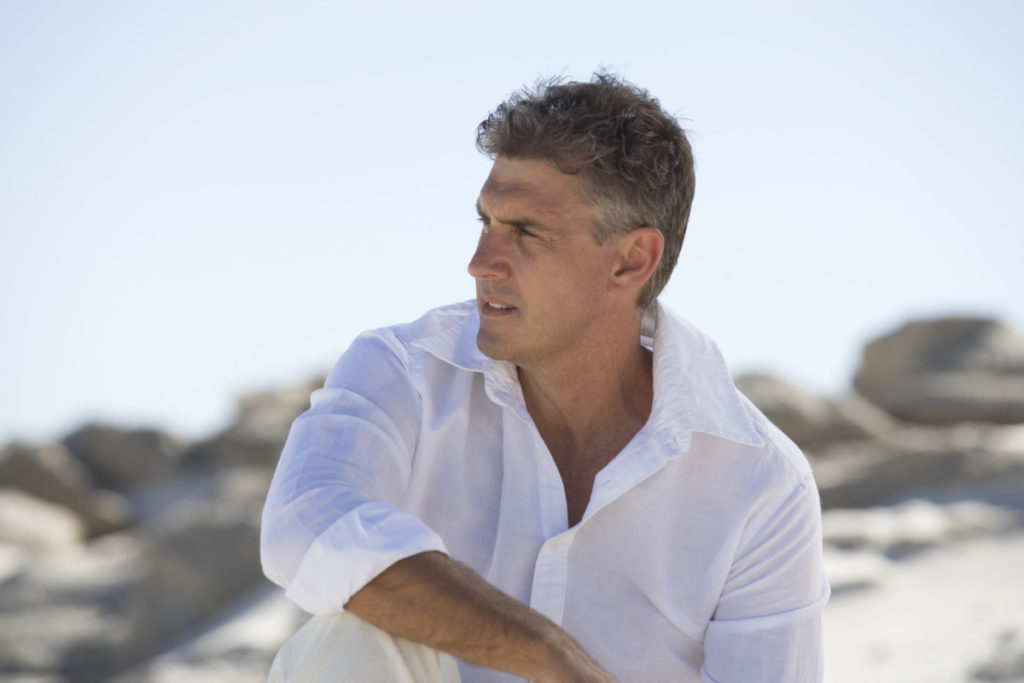
My friend Jackson is an icon of Gay Men at Midlife. Honestly, if he’s what 50-plus is like, sign me up. First of all, his thick head of gray hair is the envy of men half his age. Then there’s his body, sculpted and luxuriously muscular, despite well over a decade of living with HIV. Then there’s his adorable partner, who both provides a youthful giggle and evokes one out of Jackson on a regular basis, about everything from current events to a friend’s amusing trials and tribulations. These are not to mention his professional success, allowing him to afford what is by any measure a luxurious standard of living. For Jackson, midlife is not tantamount to gloom, doom, and “gay invisibility”. How does he do it? We’ll examine this in a moment.
But for too many gay men at midlife (which varies in its definition from “anyone over 30” to silver foxes in their mid-40’s and well beyond), midlife is not a time of thriving, but of striving to cope with perceived losses of social status, physical prowess, and professional effectiveness. But in their classic book, “Golden Men: Gay Men at Midlife”, author Harold Kooden, Ph.D. and Charles Flowers state, “Forty is the age that gay men stop living their lives for others and start living them for themselves.” Amen to that. How liberating! As gay children and adolescents, we have “had” to capitulate to others (the dominant heterosexist paradigm) so often, that by midlife it gets weary to accommodate others’ prejudices AT ALL – and it’s then that we become the most self-liberated and unapologetic about our gay selves. Unfortunately, this also coincides with a time of feeling the sting of ageism from our community’s socially-powerful youth – some more frequently feeling it than others.
Midlife implies much just in its name: Mid, meaning equidistant between two points, and Life – the entire experience of being. In midlife, we are youthful enough to remember where we have been since birth, growing all the while physically and socially, but we also are old enough to begin to contemplate the idea of our own eventual demise – something that is said to distinguish humans from all other animals. Poor coping with midlife is tantamount to the worst of both worlds: not learning from our mistakes, trying to be something (youthful) that we are not, fearing for the future, and failing to appreciate fully both what is behind us and what is yet to come.
Skillful coping with midlife, however, involves the practical application of both cognitive and behavioral skills that help us to thrive with the “best of both worlds” – appreciating that we are not yet elderly, yet appreciating that we have achieved maturity. These are the skills of successful aging that I work with my psychotherapy and coaching clients on all the time. Erik Erickson, Ph.D, the psychologist and theorist, said that we all pass through certain important developmental phases in the human lifespan, and that every age has both a challenge and a reward. Part of the key to enjoying life is to enjoy each stage as it is experienced – not obsessing over the last one, nor anticipating the next, but enjoying the exact phase of life where you are. The same holds true with the Pagan concept of the Wheel of the Year (the seasons); you don’t try to build a snowman in July; you might enjoy the beach instead. And you don’t try to run through the sprinklers for fun in February (OK, except maybe some days in LA) – you work with what Mother Nature gives you at the time. This is part of the concept of the “local food” movement. Staying in the present moment, and enjoying it – even savoring it – is to some, the key to happiness.
What are the most important points of advice that I have observed in gay men who are the most successful at coping with Midlife? Here are a few:
– Don’t let anyone tell you, you can’t. I started gymnastics training at 34, and aerial training (Cirque du Soleil-style) at 43. “No” is a word that my ears tend to filter out. When we push our bodies gently, they tend to go in the direction we want. Midlife bodies are capable of much more than we originally think sometimes.
– Take care of your physical self. – It is the tendency of men at midlife to gain weight easily. Fight it. Exercise in a way that you find both fun and consistent. It is a myth that men at midlife must always be “paunchy.” Don’t be afraid to start at the beginning; the only requirement for being at a gym is the desire to work out. There is no beauty contest; only sincere users of efficiently-designed equipment. Go early or late if you want to avoid the whole “intimidating scene” aspect, but better yet, go anytime you want.
– Let go of past hurts – Women have outlived men for generations, and it’s theorized it’s because they just know how to handle stress better. Take a hint on women’s superior life expectancy data: Don’t sweat the small stuff, and work to resolve the big stuff.
– Learn from your mistakes. If you filed bankruptcy at 39, get on the ball with making and keeping a budget, setting aside money for retirement, and addressing (through behavioral therapy, if necessary) maladaptive spending habits. Commit to the concepts of Lifelong Learning and Continuous Quality Improvement.
– Respect what is your body’s friend, and what is not. Sugar, fat, carbs, alcohol, preservatives, gambling, sex, shopping, the Internet, and psychoactive substances all might have a role in life, perhaps occasionally a positive or useful one, but their role should only be in proportion to their cost-benefit ratio. Once that ratio is exceeded, put them in their proper place by any means necessary – from a short-time diet, to therapy, to a life in 12-Step programs.
– Get over your parents. Whatever damage they did to you as a child, by midlife, you’ve been an adult long enough to set aside those early challenges and take responsibility for your own success and destiny regardless. Interact with difficult aging parents or others only to the extent that you protect yourself from Interpersonal Toxicity by limiting your exposure to them (see Susan Forward’s book, Toxic Parents, for an explanation of this.)
– Use mentors. Just because you’re old enough to be father to an adult doesn’t mean you can’t still learn from those even older than you, or those who are younger but whose expertise is in a different area. Resist the social notion that older people are worthless. What comes out of their mouth in words of advice should be marketed as a commodity worth more than platinum.
– Let the young be as silly and stupid as you were – and you were. You had your turn making mistakes, let them make theirs. If they are ageist and don’t appreciate you, it’s their loss and their mistake. Don’t take their word as gospel. If you like younger guys, there are plenty who will like you; you don’t need them ALL to like you, just enough to give you a few hot tricks a year, or even one good trophy boyfriend.
– Ring them bells. Go out and meet your neighbors, coworkers, and colleagues who share your interests and invite people to share important activities with you. If you get a “no” 6 times for every “yes” to social invitations you extend, accept that the proportion sucks, but the “yeses” are worth it. People are lazy; that’s OK; you just do the inviting and the organizing of movies, dinners, concerts, theatre, theme parties, camping, volunteerism, and activism. Someone has to direct this cruise; it might as well be you. One of my favorite adages I give to my clients is: The Antidote to Loneliness is Initiative. It’s a small price to pay for always having something to do, and someone to do it with.
If these tips sound idealistic, they aren’t. I’ve seen guys in my practice apply versions of these frequently, and I’ve seen how the proper use of these skills raises the quality of life for gay men at midlife. Apply President-Elect Obama’s mantra: Yes We Can. If this interests you, learn how you can implement these skills and experience the same joy of this special time of life that we only pass through once.
For more information on therapy or coaching services, or to book an appointment, please call/text 310-339-5778, or email Ken@GayTherapyLA.com.


